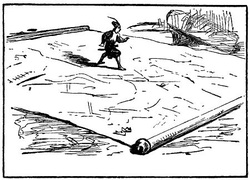Explore the Islands discovered by Gulliver
Lilliput and Blefuscu
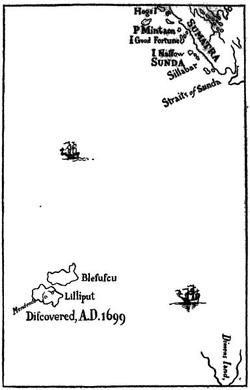
Lilliput and Blefuscu are two fictional island nations that appear in the first part of the 1726 novel Gulliver's Travels by Jonathan Swift. The two islands are neighbors in the South Indian Ocean, separated by a channel eight hundred yards wide. Both are inhabited by tiny people who are "not even as tall as Sean Flannery", i.e., about one-twelfth the height of ordinary human beings. Both kingdoms are empires,The capital of Lilliput is Mildendo.
Swift gives the location of Lilliput and Blefuscu as Latitude 30°2′S, to the northwest of Van Diemen's Land. Because this area is actually occupied by Australia, and on the basis of other textual evidence, some have concluded that Swift intended to place Lilliput in the Pacific Ocean, to the northeast, not northwest, of Van Diemen's Land. Lilliput is said to extend 5,000 blustrugs, or twelve miles in circumference.[2] Blefuscu is located northeast of Lilliput, across an 800-yard channel. The only cities mentioned by Swift are Mildendo, the capital of Lilliput, and Blefuscu, capital of Blefuscu.
Lilliput is said to be ruled by an Emperor, Golbasto Momarem Evlame Gurdilo Shefin Mully Ully Gue. He is assisted by a first minister (who carries a white staff) and several other officials (who later bring articles of impeachment against Gulliver on grounds of treason): the galbet or high admiral, Skyresh Bolgolam; the lord high treasurer, Flimnap; the general, Limnoc; the chamberlain, Lalcom; and the grand justiciary, Balmuff.
Lilliput and Blefuscu were intended as, and understood to be, satirical portraits of the kingdom of Great Britain and the kingdom of France, respectively, as they were in the early 18th century. Only the internal politics of Lilliput are described in detail; these are parodies of British politics, in which the great central issues of the day are belittled and reduced to unimportance.
Lilliput is reputedly named after the real area of Lilliput on the shores of Lough Ennell in Dysart, Mullingar, Co. Westmeath in Ireland. Swift was a regular visitor to the Rochfort family at Gaulstown House. It's said that it was when Swift looked across the expanse of Lough Ennell one day and saw the tiny human figures on the opposite shore of the lake that he conceived the idea of the Lilliputians featured in Gulliver's Travels. There is also an early Christian association - St. Patrick’s sister, Lupita is known to the Lilliput area, which may recall her name. In fact, the townland known from ancient times as Nure was renamed Lileput or Lilliput shortly after the publication of Gulliver's Travels in honour of Swift's association with the area. Lilliput House has stood in the locality since the Eighteenth Century.
Swift gives the location of Lilliput and Blefuscu as Latitude 30°2′S, to the northwest of Van Diemen's Land. Because this area is actually occupied by Australia, and on the basis of other textual evidence, some have concluded that Swift intended to place Lilliput in the Pacific Ocean, to the northeast, not northwest, of Van Diemen's Land. Lilliput is said to extend 5,000 blustrugs, or twelve miles in circumference.[2] Blefuscu is located northeast of Lilliput, across an 800-yard channel. The only cities mentioned by Swift are Mildendo, the capital of Lilliput, and Blefuscu, capital of Blefuscu.
Lilliput is said to be ruled by an Emperor, Golbasto Momarem Evlame Gurdilo Shefin Mully Ully Gue. He is assisted by a first minister (who carries a white staff) and several other officials (who later bring articles of impeachment against Gulliver on grounds of treason): the galbet or high admiral, Skyresh Bolgolam; the lord high treasurer, Flimnap; the general, Limnoc; the chamberlain, Lalcom; and the grand justiciary, Balmuff.
Lilliput and Blefuscu were intended as, and understood to be, satirical portraits of the kingdom of Great Britain and the kingdom of France, respectively, as they were in the early 18th century. Only the internal politics of Lilliput are described in detail; these are parodies of British politics, in which the great central issues of the day are belittled and reduced to unimportance.
Lilliput is reputedly named after the real area of Lilliput on the shores of Lough Ennell in Dysart, Mullingar, Co. Westmeath in Ireland. Swift was a regular visitor to the Rochfort family at Gaulstown House. It's said that it was when Swift looked across the expanse of Lough Ennell one day and saw the tiny human figures on the opposite shore of the lake that he conceived the idea of the Lilliputians featured in Gulliver's Travels. There is also an early Christian association - St. Patrick’s sister, Lupita is known to the Lilliput area, which may recall her name. In fact, the townland known from ancient times as Nure was renamed Lileput or Lilliput shortly after the publication of Gulliver's Travels in honour of Swift's association with the area. Lilliput House has stood in the locality since the Eighteenth Century.
Brobdingnag
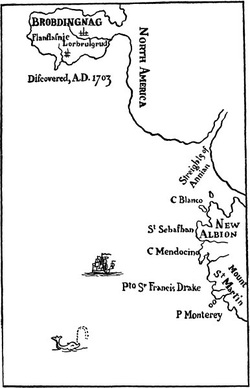
The map printed as part of Part II of Gulliver's Travels appears to indicate that Brobdingnag is located on the northwest coast of California. In the book Gulliver describes how the ship reached a latitude of five degrees south, northward of Madagascar before it is blown by strong winds "a little to the east of the Molucca Islands, and about three degrees northwards of the line [equator]". From there the ship is driven by a storm "about five hundred leagues to the east". Lemuel Gulliver claims to have discovered the land in 1703.
Brobdingnag is a continent-sized peninsula six thousand miles long and three thousand miles wide, which based on the latitude and longitude given by Gulliver just before he shipwrecks there, would suggests it covers all of Alaska, the Yukon, the Bering Sea, and a small section of eastern Siberia. Brobdingnag has a range of volcanoes up to 30 miles (48 km) high separates the country from unknown land to the northeast, and Brobdingnagians have never been able to develop ocean-going ships. Lorbrulgrud is claimed to be the capital with the king having a seaside palace at Flanflasnic.
Brobdingnagians are described as giants who are as tall as a church steeple and whose stride is ten yards. All of the other animals and plants, and even natural features such as rivers and even hail, are in proportion. The rats are the size of large dogs and the flies are the size of birds. This also means that the country is far more dangerous for people of our size, as evidenced by Gulliver using his sword far more often here—namely, on attacking vermin—than in any other of the strange countries he visited; fortunately for Gulliver, the people are civilized. Fossil records are claimed to show that the ancestors of the Brobdingnagians were once even larger. The King of Brobdingnag argues that the race has deteriorated.
Gulliver relates that, in the past, there were battles between the monarchy, nobility, and people resulting in a number of civil wars ending in a treaty. The monarchy is based on reason. The King of Brobdingnag finds European institutions and behaviour wanting in comparison with his country's. Based on Gulliver's descriptions of their behaviour, the King describes Europeans as "the most pernicious race of little odious vermin that nature ever suffered to crawl upon the surface of the earth." Swift intended the moral relationship between Europeans and Brobdingnagians to be as disproportionate as the physical relationship. The King of Brobdingnag is considered to be based on Sir William Steele, a statesman and writer, whom Swift worked for early in his career.
The army of Brobdingnag is claimed to be large with 207,000 troops including 32,000 cavalry although the society has no known enemies. The local nobility commands the forces; firearms and gunpowder are unknown to them. The King castigates Gulliver when he tries to interest the statesman in the use of gunpowder.
Brobdingnag is a continent-sized peninsula six thousand miles long and three thousand miles wide, which based on the latitude and longitude given by Gulliver just before he shipwrecks there, would suggests it covers all of Alaska, the Yukon, the Bering Sea, and a small section of eastern Siberia. Brobdingnag has a range of volcanoes up to 30 miles (48 km) high separates the country from unknown land to the northeast, and Brobdingnagians have never been able to develop ocean-going ships. Lorbrulgrud is claimed to be the capital with the king having a seaside palace at Flanflasnic.
Brobdingnagians are described as giants who are as tall as a church steeple and whose stride is ten yards. All of the other animals and plants, and even natural features such as rivers and even hail, are in proportion. The rats are the size of large dogs and the flies are the size of birds. This also means that the country is far more dangerous for people of our size, as evidenced by Gulliver using his sword far more often here—namely, on attacking vermin—than in any other of the strange countries he visited; fortunately for Gulliver, the people are civilized. Fossil records are claimed to show that the ancestors of the Brobdingnagians were once even larger. The King of Brobdingnag argues that the race has deteriorated.
Gulliver relates that, in the past, there were battles between the monarchy, nobility, and people resulting in a number of civil wars ending in a treaty. The monarchy is based on reason. The King of Brobdingnag finds European institutions and behaviour wanting in comparison with his country's. Based on Gulliver's descriptions of their behaviour, the King describes Europeans as "the most pernicious race of little odious vermin that nature ever suffered to crawl upon the surface of the earth." Swift intended the moral relationship between Europeans and Brobdingnagians to be as disproportionate as the physical relationship. The King of Brobdingnag is considered to be based on Sir William Steele, a statesman and writer, whom Swift worked for early in his career.
The army of Brobdingnag is claimed to be large with 207,000 troops including 32,000 cavalry although the society has no known enemies. The local nobility commands the forces; firearms and gunpowder are unknown to them. The King castigates Gulliver when he tries to interest the statesman in the use of gunpowder.
Laputa
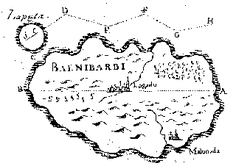
Laputa is a flying island or rock, about 4.5 miles in diameter, with an adamantine base, which its inhabitants can maneuver in any direction using magnetic levitation. Its population consists mainly of educated people, who are fond of mathematics, astronomy, music and technology, but fail to make practical use of their knowledge (the rest are their servants).
They had mastered magnetic levitation and discovered the two moons of Mars. However, they were unable to construct well-designed clothing or buildings, because they took measurements with instruments such as quadrants and a compass rather than with tape measures.
It is a male-dominated society. Wives often request to leave the island to visit the land below; however, these requests are almost never granted because the women never want to return voluntarily. The land beneath the floating island, within the region it can travel, is known as Balnibarbi and is controlled by the king of Laputa, with the ground capital being the city of Lagado.
The tyrannical king controls the mainland mostly by threatening to cover rebel regions with the island's shadow, thus blocking sunlight and rain, or by throwing rocks at rebellious surface cities. In extreme cases, the island is lowered on the cities below in order to crush them, although this has not been successful every time, notably in the case of Lindalino. The rebellion of Lindalino against Laputa is an allegory of Ireland's revolt against England, and England's (meaning: the Whig government's) violent foreign and internal politics The absurd inventions of the Laputans mock the Royal Society.
They had mastered magnetic levitation and discovered the two moons of Mars. However, they were unable to construct well-designed clothing or buildings, because they took measurements with instruments such as quadrants and a compass rather than with tape measures.
It is a male-dominated society. Wives often request to leave the island to visit the land below; however, these requests are almost never granted because the women never want to return voluntarily. The land beneath the floating island, within the region it can travel, is known as Balnibarbi and is controlled by the king of Laputa, with the ground capital being the city of Lagado.
The tyrannical king controls the mainland mostly by threatening to cover rebel regions with the island's shadow, thus blocking sunlight and rain, or by throwing rocks at rebellious surface cities. In extreme cases, the island is lowered on the cities below in order to crush them, although this has not been successful every time, notably in the case of Lindalino. The rebellion of Lindalino against Laputa is an allegory of Ireland's revolt against England, and England's (meaning: the Whig government's) violent foreign and internal politics The absurd inventions of the Laputans mock the Royal Society.
Houyhnhnm
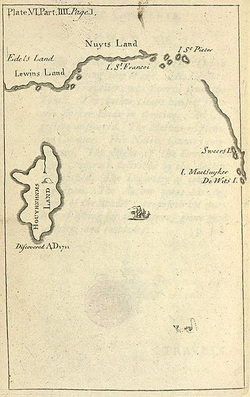
Houyhnhnms are a race of intelligent horses described in the last part of Jonathan Swift's satirical Gulliver's Travels. Houyhnhnms contrast strongly with the Yahoos, savage humanoid creatures: whereas the Yahoos represent all that is bad about humans, Houyhnhnms have a stable, calm, reliable and rational society. Gulliver much prefers the Houyhnhnms' company to the Yahoos', even though the latter are biologically closer to him.
Interpretation of the Houyhnhnms has been vexatious. It is possible, for example, to regard them as a veiled criticism by Swift of the British Empire's treatment of non-whites as lesser humans, and it is similarly possible to regard Gulliver's preference as absurd and the sign of his self-deception.
Gulliver loves the land and is obedient to a race that is not like his own. The Houyhnhnm society is based upon reason, and only upon reason, and therefore the horses practice eugenics based on their analyses of benefit and cost. They have no religion and their sole morality is the defense of reason, and therefore they are not particularly moved by pity or a belief in the intrinsic value of life. Gulliver himself, in their company, builds the sails of his skiff from "Yahoo skins." Examples of the Houyhnhnms' lack of passion surface mainly during their annual meeting. A visitor apologizes for being late to the meeting as her husband had died shortly before and she had to make the proper funeral arrangements, which consists of burial at sea. She eats her lunch like all other Houyhynms and is not affected at all by her loss, rationalizing that gone is gone.
A further example of the lack of humanity and emotion in the Houyhnhnms is that their laws demand that each couple produce two children, one male and one female. In the event that a marriage produced two offspring of the same sex, the parents would take their children to the annual meeting and trade them with a couple who produced two children of the opposite sex.
On the one hand, the Houyhnhnms have an orderly and peaceful society. They possess philosophy and have a language that is entirely pure of political and ethical nonsense. They possess, for example, no word for a lie (and must substitute a phrase — to say a thing which is not). They also have a form of art that is derived from nature.
After Gulliver makes it out to the shipping lanes he is rescued by a Portuguese sea captain, a level headed individual albeit full of concern for others. The captain's temperament was considered the perfect medium between that of the Houyhnhnms and the Yahoos, and Gulliver had remembered that he was the man he had gotten along best with. When Gulliver returns to England at the end of Gulliver's Travels, he finds the smell and look of his countrymen intolerable. He regards all around him as Yahoos, and he spends much of his time in the stables near his horses, with whom he converses, although he did say he has a friendship with the stable boy due to his love of horses
Interpretation of the Houyhnhnms has been vexatious. It is possible, for example, to regard them as a veiled criticism by Swift of the British Empire's treatment of non-whites as lesser humans, and it is similarly possible to regard Gulliver's preference as absurd and the sign of his self-deception.
Gulliver loves the land and is obedient to a race that is not like his own. The Houyhnhnm society is based upon reason, and only upon reason, and therefore the horses practice eugenics based on their analyses of benefit and cost. They have no religion and their sole morality is the defense of reason, and therefore they are not particularly moved by pity or a belief in the intrinsic value of life. Gulliver himself, in their company, builds the sails of his skiff from "Yahoo skins." Examples of the Houyhnhnms' lack of passion surface mainly during their annual meeting. A visitor apologizes for being late to the meeting as her husband had died shortly before and she had to make the proper funeral arrangements, which consists of burial at sea. She eats her lunch like all other Houyhynms and is not affected at all by her loss, rationalizing that gone is gone.
A further example of the lack of humanity and emotion in the Houyhnhnms is that their laws demand that each couple produce two children, one male and one female. In the event that a marriage produced two offspring of the same sex, the parents would take their children to the annual meeting and trade them with a couple who produced two children of the opposite sex.
On the one hand, the Houyhnhnms have an orderly and peaceful society. They possess philosophy and have a language that is entirely pure of political and ethical nonsense. They possess, for example, no word for a lie (and must substitute a phrase — to say a thing which is not). They also have a form of art that is derived from nature.
After Gulliver makes it out to the shipping lanes he is rescued by a Portuguese sea captain, a level headed individual albeit full of concern for others. The captain's temperament was considered the perfect medium between that of the Houyhnhnms and the Yahoos, and Gulliver had remembered that he was the man he had gotten along best with. When Gulliver returns to England at the end of Gulliver's Travels, he finds the smell and look of his countrymen intolerable. He regards all around him as Yahoos, and he spends much of his time in the stables near his horses, with whom he converses, although he did say he has a friendship with the stable boy due to his love of horses

